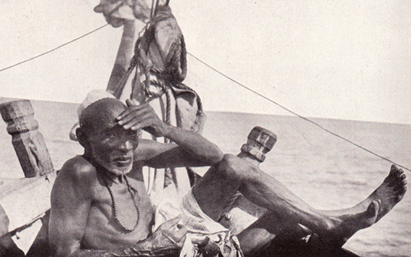
Sheik Issa Embarks on the ‘Altair’ for Arabia. He is honored and respected among the Danakil as a leader and saint. Not only was he a gracious host, but he offered to accompany the Altair’s party from the Somali coast over to Arabia, in order to afford them protection from pirates.
[Webshaykh’s Note: Much attention has been given to the Somali pirates loose in the Gulf of Aden. Piracy is no stranger to this corner of the Horn of Africa, nor to seafaring anywhere in history. Here is an excerpt by an American woman visiting the French Somaliland coast in 1930. Ms. Treat indeed provides a colorful narrative treat of her journey aboard a dhow captained by a French convert to Islam. The whole article is well worth reading, as the following excerpt suggests.]
by Ida Treat, The National Geographic Magazine, 1931
Wading through the warm lagoon, breast deep, we crossed the damp sand among the mangroves, treading down the rubbery shoots among which lay quantities of black sea snails, for it was low tide. Beyond the mangroves, the beach stretched bare and white to the four huts, bleached as driftwood, and of so light a construction it seemed that a puff of wind would scatter them across the sand.
Two downy baby camels, in a narrow inclosure of mimosa thorns, darted snakelike necks through the ranches as we passed. From the largest of the huts a man came toward us. I recognized Sheik Issa, whom I had sen at Obock, his lean torso bare, the wooden prayer beads about his neck, swinging across the sand with a vigorous, youthful stride, for all his sixty-odd years.
The day before he had sent the Altair from the heights of Djebel Ghin and had walked all night to be at Angar to welcome us. Sheik Issa, the Danakil had told me, was one of the great men of the tribe, honored and respected as leader and saint, whose word sufficed to maintain peace among the tribesmen or set every man of them in arms. Rich with flocks in the Mabla camels, and sambuks, he owned houses and wives in more than one Dankali town. But his hut at Angar differed in no respect from those of the three fisher families, his neighbors. It was bare except for a prayer mat, and an empty packing box, and a crescent-shaped wooden head rest on which the Dankali sleeps.
A handsome young woman brought us camel’s milk in wooden bowls. Dressed in flaming Arab silks, her arms glittering with copper bracelets, and silver earrings tinkling against her dark cheeks, she was like a gorgeous bird in the colorless landscape. A naked child trotted at her heels, Sheik Issa’s youngest, its plump little body glistening with butter and its dozens of tiny braids gay with ribbons and cowrie shells.
When she had served us, the young wife disappeared. Seated on the packing box while we crouched on the prayer mat at his feet, Sheik Issa told us stories of the not-too-distant past, of the great slave trade between Ethiopia and Arabia and its clandestine survival; of European opposition to the trade and the consequent deep hatred of the Danakil – slave merchants from time immemorial – for the interfering whites.
“I am an old man. I have traveled much,†Sheik Issa concluded. “Perhaps among white men there is honor, but I have yet to see the European who will not betray his given word when he has pledged it to a Dankali.â€
The master of the Altair lifted a hand in protest.
“Not you, Abd el Hai.†The sheik touched my companion’s shoulder lightly with his fingers. “You are a Believer and your skin is almost as black as mine; and surely the blood of some dark woman runs in your veins, for Allah’s curse does not lie upon you; you dare show your head uncovered to the sun!â€
With an abrupt change of tone, Sheik Issa inquired where we were going.
“Across the Strait of Bab-el-Mandeb to Khor Omeira, in Arabia,†the master of the Altair replied, with a gesture toward the open sea.
The sheik shook his head thoughtfully.
“It is not wise, my friend. Since the white man’s war, the coast over there throngs with arami (pirates). Only last week they beached a sambuk of our Danakil and massacred the crew. They will not respect even the name of Abe el Hai. And with Madame on board –†He paused impressively. “There is only one man who can assure your safety.â€
“And he?â€
“Myself. I will go with you.â€
Late that afternoon Sheik Issa came aboard, bringing with him a sheep, that the crew might feast in his honor. The sun dipped down behind the Mabla; the evening star hung above the horizon; silhouetted against the sky, a tall draped figure lifted its arms to heaven. The sheik was at his prayers. When night came we set sail. Sure in the protection of our Moslem saint, we headed east, in a calm sea, toward Arabia, its pirates, and the pearl-bearing waters of Khor Omeira, a hundred miles distant from the strait.
Excerpt from Ida Treat, “Sailing Forbidden Coasts,†The National Geographic Magazine 60(3):385-386, 1931).